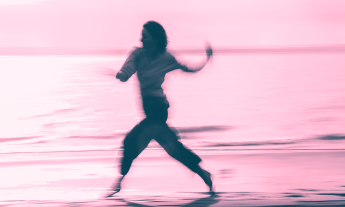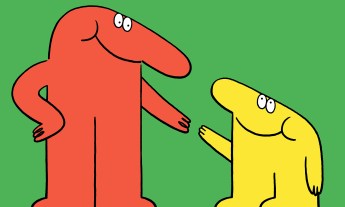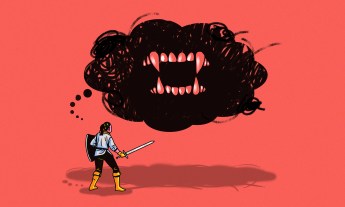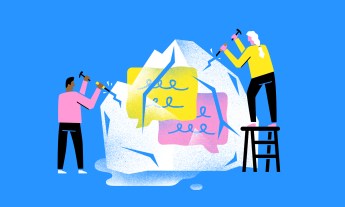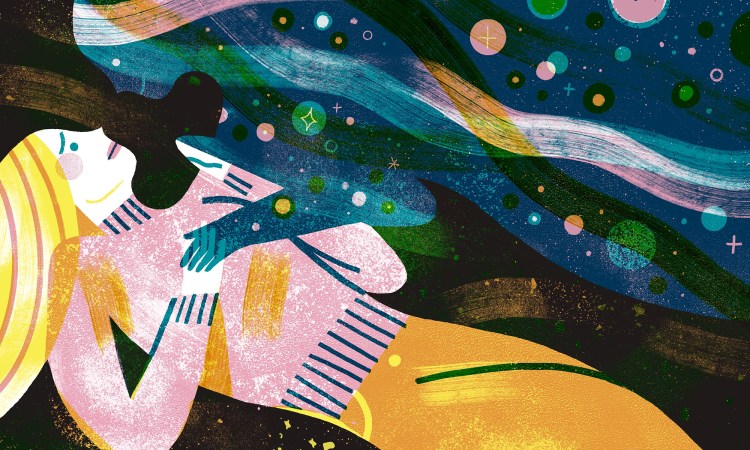
This post is part of TED’s “How to Be a Better Human” series, each of which contains a piece of helpful advice from people in the TED community; browse through all the posts here.
It was the summer of 2002, and I was sitting around a campfire with my college boyfriend and some of his friends.
He was a year younger than me and headed back to school in the fall; I was moving to Washington DC, for my first job. Even though we were spinning off in different directions, we weren’t quite ready for it to end. On a whim I said, “Let’s go to Iceland!”
“Iceland?” he said, looking at me strangely.
“Yeah! It’s beautiful there, and I want to see the Northern Lights.”
I can’t remember his exact reply, but it was not enthusiastic. We broke up two months later.
Iceland was a symbol of a lot of things for me. It was an indicator of compatibility, but it was also a thing I believed I needed to do with a partner. And finding a partner was the one thing that I truly felt I needed in order to be happy in life.
This habit of saying “I’ll be happy when …” is far more insidious than it seems on the surface.
In fact, whenever anything good happened to me, I thought, “Sure, this is nice, but I’ll be happy when I find a partner.”
When I found a beautiful new apartment, I envisioned all the dinner parties that I could host if I just had the right person to host them with. “I’ll be happy when I can find someone to share this place with,” I thought.
When I got a promotion, I went out for drinks with my friends and thought, “I’ll be happy when I’m not the only one sitting here single.”
And as I saw my coupled friends share their vacations on social media while I went home to visit my family yet again, I thought, “I’ll be happy when I finally find someone who will go to Iceland with me.”
And there they are, those four joy-killing little words: “I’ll be happy when …”
You might have said them yourself, or you might be better acquainted with their cousins “When I get through ____________, I’ll feel better” or “If I just had ______________, life would be great.”
We say these words all the time casually, carelessly. They seem innocuous enough, just an expression of a desire or dream. But in fact, this habit of saying “I’ll be happy when …” is far more insidious than it seems on the surface.
That’s because “I’ll be happy when …” isn’t just a phrase. It’s a mindset — and that mindset keeps us waiting for happiness instead of cultivating joy in our lives right now.
Reaching a milestone can feel good, but eventually we start to look for the next milestone, and then we’re back to thinking “I’ll be happy when …” all over again.
Happiness and joy are not the same thing
We often use the words “happiness” and “joy” interchangeably, but in fact they’re different things — and I find it really helps to pull them apart.
Happiness is a broad evaluation of how we feel about our lives over time. It’s synonymous with what psychologists call “subjective well-being” and encompasses a range of different factors, including how we feel about our health and our work, whether we feel we have meaning and purpose in life and how connected we feel to other people.
If happiness is how we feel about our lives over time, joy is how we feel in the moment. Joy is an intense, momentary burst of positive emotion. We can tell we’re experiencing joy because we feel it in our bodies as well as our minds. We smile and laugh, our posture opens, and we may feel warm or light. Joy makes us feel like the best version of ourselves — energized, invigorated, and alive.
Because happiness is somewhat big and complex, it’s not always easy to know what will make us happy. Many of us have been conditioned to see happiness as tied to certain big milestones in life, such as finding a partner, getting a promotion, buying a house, having a child. We tell ourselves that securing these things will complete the puzzle and give us our “happily ever after.” But the reality is, we’re not always especially good at predicting what will make us happy.
Research has shown that while happiness tends to spike in the wake of this kind of big life event, it tends to return to its natural set point not long after. Reaching a milestone can feel good, but eventually we start to look for the next milestone, and then we’re back to thinking “I’ll be happy when …” all over again.
It’s also important to note that we don’t actually have a lot of control about how or when these big things happen to us. And the problem is when we fixate on these milestones, it can sabotage the joy we find in our lives right now.
In other words: In our pursuit of happiness, we end up postponing joy.
Every time we say to ourselves “I’ll be happy when …” what we’re really saying is “I can’t be happy now.”
How?
We put off spending time with the people we love to put in overtime at work so we can get that raise.
We don’t have time for hobbies because we have to take on side hustle to get ahead in our career.
We don’t decorate our rental apartment because we want to save every single penny for a down payment, but in the meantime we live in a boring blank box.
We put off the trip to Iceland until we have the right partner to go with. But then as we scroll through our Instagram feed, it feels like everyone else is living life while we’re just sitting on the sidelines.
Focusing on uncertain life events takes away our power to create joy in the present. Every time you say to yourself “I’ll be happy when …” what you’re really saying is “I can’t be happy now.” And if you can’t be happy now, because you’re missing some essential ingredient for the perfect life, then why bother trying?
The habit of saying “I’ll be happy when …” keeps us waiting for life to happen to us instead of creating a life we want right now. It makes us passive and stuck, like we’re watching a TV show about our life and looking to see what the writers have come up with for the next episode instead of being active and realizing that we are the creators of our own life. It keeps us wishing and searching instead of enjoying and living.
The habit of saying “I’ll be happy when …” keeps us wishing and searching instead of enjoying and living.
Here’s how I stopped waiting for happiness
In 2011, I’d been dating someone for most of a year and it wasn’t going very well. I took him to Bermuda for my childhood best friend’s wedding, and while I was doing bridesmaid things, he downed a bunch of dark-n-stormys in town with strangers and showed up to the ceremony drunk. Things went downhill from there. As I was trying to figure out if the relationship could be salvaged, one day I suggested, “Let’s go to Iceland!” The lack of enthusiasm I was met with felt familiar.
Two days later, I booked a New Year’s trip to Iceland — by myself. “You can come if you want,” I said to the boyfriend. “You just need to book a ticket.”
We broke up a few weeks later, and come New Year’s, I was traversing lava fields and soaking in geothermal pools by my lonesome.
What do you think happened when I finally took that trip to Iceland after nearly 10 years of thinking about it? I found joy!
I reached out to an artist I had profiled, and we met at an art museum. She ended up inviting me to her family’s New Year’s celebration, and I watched the fireworks explode over Reykjavik with three generations of Icelanders. I ate fish and chips and scribbled in my journal. I booked a trip to Snæfellsnes, which ended with spiked hot chocolate and singing carols with a crowd of farmers in an inn. I made new friends on my Iceland trip, and I visited two of them just a few years ago in Copenhagen. And I finally got to see the Northern Lights, which were more magical than I had imagined.
Even though moments of joy are small, they do something significant: They expand our world.
So often we dismiss joy because it seems like a distraction from the big happiness we’re hoping for. But even though moments of joy are small, they do something significant: They expand our world.
I think sometimes when we’re waiting for happiness, we freeze in place. It’s as if we’re stranded on a deserted island and we don’t want to move because we’re worried that the thing we’re hoping for (the rescue plane) might not be able to find us.
But what I’ve learned about leaning into the present rather than waiting for the future is that something unexpected always happens. Sometimes it’s adventure, and then you’re left with memories you never would’ve had if you’d just waited for happiness to find you. Other times, we find new friends, new opportunities, new inspiration — things that may actually help you get to the happiness you’re seeking faster or help you uncover a new definition of happiness.
And whether that happiness comes sooner or later, in the meantime you’re living a full life, one that is rich in joy.
Now, when I catch myself saying some version of “I’ll be happy when …” I try to imagine myself in the future, looking back on right now.
So what are you waiting for?
All that said, I can’t pretend I never say “I’ll be happy when …” Certainly, during these pandemic years, I found myself fantasizing about what it would be like to take my baby to a cafe or a music class without ever having to think about COVID.
But I’ve realized that waiting for happiness is a habit, and like any other habit, we can break it. Now, when I catch myself saying some version of “I’ll be happy when …” I try to imagine myself in the future, looking back on right now.
Then I ask myself: “How will I wish I’d used this time?” Asking this question always brings me back to joy, because the answer is never “Waiting for things to change.” Usually, it’s more like “Living the best version of my life as it is right now.”
See, waiting for happiness is often rooted in a kind of perfectionism, which works backwards from an imagined perfect life and measures everything else against it. Anything that falls short of that so-called perfect life is a disappointment. And since perfection is unattainable, even when you do get the thing you were hoping for, you’re constantly operating at a deficit.
Joy, on the other hand, starts where you are. Joy begins with a beautifully imperfect life and asks: How can we can make this life more vibrant, more fun, more full of the things that make us excited to wake up in the morning? It’s a creative mindset, not a comparing one.
I went to Iceland again in 2016, five years after that solo trip — this time with my husband Albert. We saw puffins nesting in the side of a cliff, foraged for wild bilberries, and went to Elf School. And you know what? That trip was better simply because I’d been there before. New memories mingled with old, and I had the joy of getting to introduce the person I loved to a place that was special to me. I was so glad I hadn’t waited.
Is there something that you’re waiting for before you can be happy? What would happen if you stopped waiting and started creating joy right now?
This post was first published on Ingrid Fetell Lee’s site, The Aesthetics of Joy. Go there, and learn about how you can build more joy into your life.
Watch her TED Talk now:








